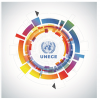News
Displaying Results 26 - 46 of 46
Statistics are all around us. All the more since the COVID-19 pandemic began. Rarely do we see a news story, political debate, press conference or even a social media debate that doesn’t reference statistics. In this environment, the custodians of the figures—the national statistical offices (NSOs…
A team of expert labour statisticians is to be convened by UNECE for the Conference of European Statisticians, to investigate how to reflect new ways of working in the employment figures we use every day.
Over the past year the work-from-home orders and business closure rules issued by many…
The importance of statistical information to help us cope with disasters has never been clearer than over the past year. As the Covid-19 pandemic has gripped the world, numbers have become our bread and butter. Yet the pandemic has also highlighted the challenges and imperfections in many systems; …
The extraction of raw materials worldwide has more than doubled since 1990 and could double again by 2060 in the absence of corrective policies. According to the UN International Resources Panel, resource extraction and processing account for 90% of global biodiversity loss and water stress impacts…
UNECE continues to help its member States to respond to COVID-19 crisis. As part of this work, Guidelines and Best Practices for Micro-, Small and Medium Enterprises in Delivering Energy-Efficient Products and in Providing Renewable Energy Equipment developed earlier are being customized for North…
The Government of Ukraine is currently implementing a broad policy agenda aimed at achieving the Sustainable Development Goals (SDGs) and pursuing a resilient, inclusive and sustainable post-COVID recovery. UNECE, together with UNDP, UNICEF and WHO, is supporting these efforts through a Joint…
While consumer demand for sustainable goods is an important driver for change, regulation and policy change are essential if the world is to side-step a climate catastrophe and bend traditional linear economic models towards a circular economy and sustainable future. Until recently it wasn’t clear…
The 56 countries of the UNECE region, spanning from North America to Europe, the Balkans, the Caucasus and Central Asia, are major users and producers of natural resources. Efficiency in the domestic use of resources continues to increase in the region, but the overall material footprint, which…
A new working paper, Measuring Migration and Remittances in UNECE Countries during the Pandemic, reveals both innovative solutions and continued hurdles as countries strive to gather information about international migration under pandemic conditions.
The onset of the Covid-19 pandemic brought…
Systemic deficiencies with regard to access to information, decision-making or compliance with environmental law can seriously threaten successful implementation of circular and green economy and sustainable development. Taking a case to court to advance a widely shared public interest remains an…
The COVID-19 pandemic has had a dramatic impact on cities and the wellbeing of communities. Cities and urban areas are at the frontline in the fight against the COVID-19 public health crisis and its socio-economic consequences. They also hold significant potential for recovering better by adopting…
With the COVID-19 pandemic, Trade facilitation has acquired even greater importance for the land-locked countries of Central Asia, as it helps remove burdensome formalities for their trade and transport operations. Simplifying and digitalizing procedures helps diminish physical contacts along…
Uzbekistan has shown remarkable growth in its transition from a centrally planned to a market based economy, with annual growth rates between 5 and 9 per cent since 2004. Innovation, namely fostering experimentation and collaboration between innovation stakeholders to find new ways for creating…
A circular economy is a paradigm which can contribute to reducing the economic, environmental and social costs of resource use, while at the same time strengthening economic competitiveness, reducing poverty, and providing better quality of life, in line with the United Nations 2030 Agenda for…
A new working paper, Adapting household surveys to the situation of the pandemic, shows that statistical producers in countries in the UNECE region have moved fast to measure the effects of the pandemic on households, and to adapt data collection to crisis conditions; but they need support for…
Waste has turned into one of humanity’s predominant challenges. The generation of hazardous waste increased from an estimated 259 metric tonnes in 2007 to 394 metric tonnes in 2015; the most significant increases were from lower middle-income and higher middle-income countries and despite policy…
Consumers are increasingly interested in making more environmentally and ethically aware choices when it comes to the clothes and shoes they wear, according to a series of recent studies. But the sector is awash with complex language and misleading labelling that makes it difficult for consumers to…
Technologies can play a key role in the transition from a linear towards circular economy. Circular strategies represent key investments to shape trade and logistics that are more resilient, resource-efficient and cost-effective, supporting the Sustainable Development Goals.
However, the risk…
The economic downturn due to COVID-19 will hit the countries of the UN Special Programme for the Economies of Central Asia (SPECA) – Afghanistan, Azerbaijan, Kazakhstan, Kyrgyzstan, Tajikistan, Turkmenistan and Uzbekistan – hard and exacerbate existing vulnerabilities. As a region highly reliant…
The risk that advances in digital technology benefit those who are already online and could contribute to greater inequality within and among countries needs to be addressed by effective policies, leaving no one behind.
The United Nations system is engaged to help address these…
Supporting countries in the implementation of the Sustainable Development Goals (SDGs) is UNECE’s key priority. The SDGs are embedded in all UNECE workstreams, including trade. Sustainable trade reforms can promote inclusive growth, job creation and poverty reduction, thus contributing to the…


















